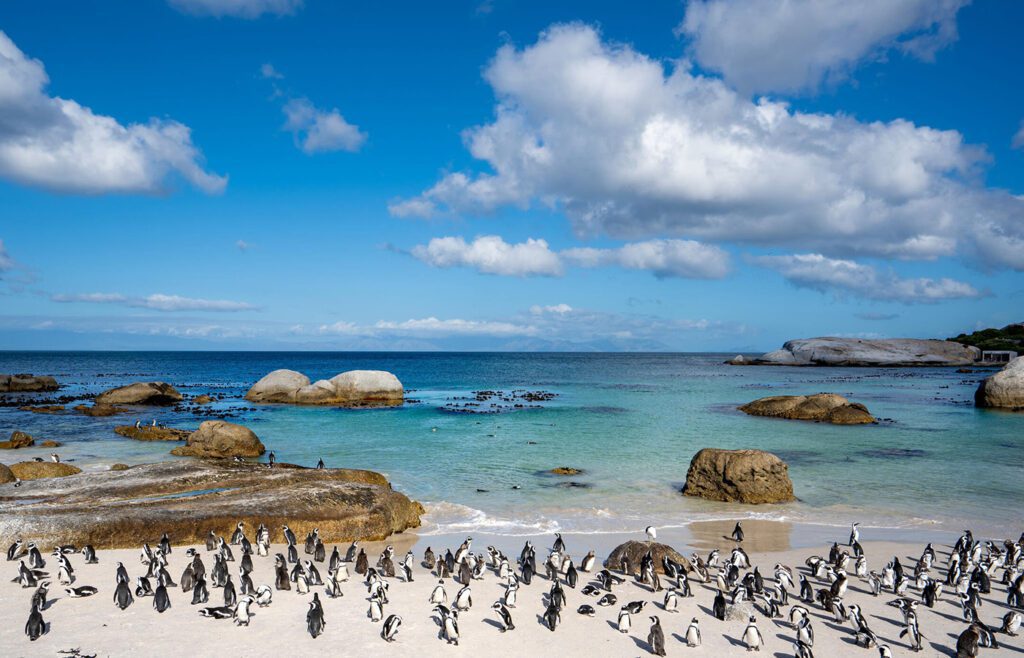Boulder Beach became home to African penguins in 1982 when two breeding pairs established a colony among the distinctive granite boulder formations. This protected marine sanctuary now represents one of only two land-based African penguin breeding colonies accessible to the public, alongside Stony Point at Betty’s Bay.
IN SUMMARY
Boulder Beach represents one of only two land-based penguin colonies globally accessible to visitors, where endangered African penguins thrive alongside Simon’s Town’s naval operations. New Antarctic research partnerships reveal warm-water penguin behaviors through innovative tracking technology, while controlled boardwalk access provides unique wildlife observation opportunities within protected granite boulder habitats.
The colony’s daily rhythm follows natural feeding patterns, with penguins emerging at sunrise from their boulder nest sites to begin fishing expeditions in False Bay’s nutrient-rich waters. Visitors observe these behaviors from elevated wooden boardwalks strategically positioned to maintain appropriate distances while providing optimal viewing opportunities.
Conservation Facts: African penguins can swim at speeds reaching 20 kilometers per hour and dive to depths of 60 meters, making them highly efficient marine predators. Their streamlined bodies and powerful flippers enable pursuit of sardines and anchovies in the productive Benguela Current system.
Marine biologists emphasize that African penguins represent warm-weather adaptations distinct from their Antarctic relatives. False Bay’s temperate waters and granite shoreline provide ideal breeding conditions, while the protected coastal environment offers security from terrestrial predators. These factors have enabled the Boulder Beach colony to flourish despite broader population challenges facing the species across southern Africa.
Conservation Through Tourism Innovation
South African National Parks has implemented comprehensive visitor management protocols at Boulder Beach, transforming traditional wildlife viewing into structured conservation experiences. The reserve operates under controlled access systems requiring advance booking through the official SANParks online platform.
Current adult entry fees are R80, with reduced rates for children and South African residents. The timed-entry system, enhanced following COVID-19 protocols, limits daily visitor numbers to reduce wildlife stress while maintaining quality viewing experiences.
Boulder Beach features elevated wooden boardwalks that allow close penguin observation while protecting sensitive nesting areas. The existing infrastructure includes visitor information centers, designated photography areas, and educational displays explaining African penguin conservation challenges.
According to SANParks management, the controlled access approach has measurably reduced disturbance to breeding colonies. Visitor satisfaction surveys indicate increased appreciation for conservation efforts when educational components accompany wildlife viewing experiences.
The reserve offers guided interpretive programs led by qualified rangers, providing insights into penguin behavior, marine ecosystem dynamics, and ongoing research initiatives. These educational components transform passive tourism into active conservation awareness.
The Antarctic Connection
South African marine researchers collaborate with international Antarctic programs through established scientific networks, contributing African penguin behavioral data to broader Southern Ocean ecosystem studies. These warm-water penguin populations provide valuable comparative insights for understanding climate impacts across different marine environments.
African penguins function as important marine ecosystem indicators, with their breeding success and feeding patterns reflecting regional ocean health. Changes in sea surface temperatures and nutrient distribution – influenced by broader Southern Ocean circulation patterns – directly affect sardine and anchovy populations that sustain the Cape Peninsula’s penguin colonies.
Conservation research at Boulder Beach employs modern wildlife monitoring technology including GPS tracking devices, automated camera systems, and environmental sensors that document penguin behavior and local marine conditions. This data contributes to international seabird research databases and climate change impact assessments.
Visitor experiences include guided early morning observation sessions, educational presentations by marine biologists, and specialized photography workshops designed to showcase penguin behavior while maintaining conservation protocols.

Beyond the Beach: Simon’s Town’s Naval Heritage
Simon’s Town’s distinctive character emerges from its remarkable dual function as South Africa’s principal naval headquarters and a critical marine wildlife sanctuary. The South African Navy’s Simon’s Town Naval Base, with origins dating to British colonial naval operations, operates adjacent to Boulder Beach’s internationally significant African penguin breeding colony.
The town’s well-preserved Victorian architecture, heritage of British naval occupation from 1795-1957, provides an extraordinary historical context for contemporary conservation efforts. Historic buildings line the main thoroughfare, creating compelling photographic opportunities that juxtapose 19th-century naval heritage with modern marine wildlife protection initiatives.
The Simon’s Town Museum chronicles the town’s evolution from strategic British naval outpost to modern conservation center, featuring maritime artifacts alongside comprehensive displays documenting African penguin research and protection efforts.
Planning Your Penguin Encounter
Simon’s Town lies 47 kilometers south of Cape Town via the scenic M4 coastal route, passing through the charming fishing villages of Kalk Bay and Fish Hoek. The journey typically requires 50-70 minutes depending on traffic conditions. The Southern Line commuter train provides an alternative public transport option with False Bay coastal views, though service reliability varies.
Boulder Beach entry requires advance booking through SANParks, with adult tickets currently R80. Vehicle parking availability is limited during peak season (December-February). The nearby Seaforth Beach area offers several dining options within walking distance of the penguin colony.
Accommodation ranges from budget guesthouses in the village center to premium coastal properties. Rates vary significantly by season and should be verified directly with establishments for current pricing.
Conservation Guidelines: Maintain minimum 10-meter distances from all penguins, avoid flash photography which can stress the birds, and never attempt to feed or touch the animals. These guidelines ensure both visitor safety and wildlife protection.



